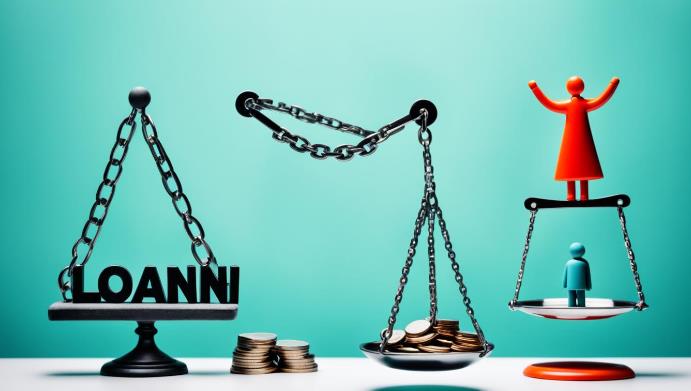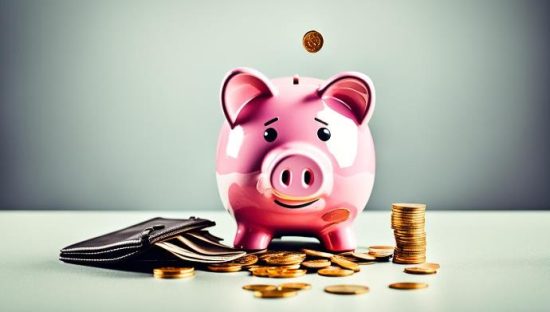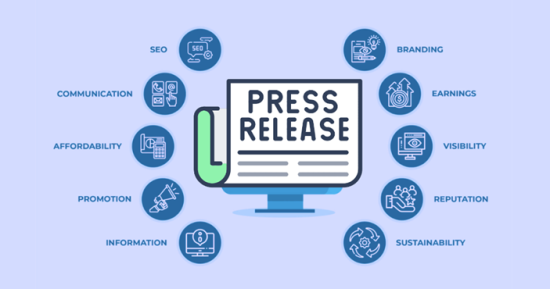
Did you know that the personal loan market in the United States reached a staggering $188 billion in 2023? This rapid growth highlights the increasing demand for this type of financing, but it also raises questions about whether personal loans are truly a wise financial decision.
Personal loans can be a useful financial tool for covering unexpected expenses, consolidating debt, or making large purchases. However, they also come with potential drawbacks that consumers should carefully consider. This article will explore are personal loans bad to help you determine if this type of financing is right for your financial situation.
Understanding Personal Loans

Personal loans are a type of unsecured consumer loan that provide a lump sum of funds the borrower can use for a variety of purposes. Unlike secured loans that require collateral, personal loans are approved based on the borrower’s creditworthiness and ability to repay. They typically have fixed interest rates and repayment terms ranging from 2 to 7 years.
What Are Personal Loans?
Personal loans are a type of unsecured consumer loan that provide a lump sum of funds the borrower can use for a variety of purposes. Unlike secured loans that require collateral, personal loans are approved based on the borrower’s creditworthiness and ability to repay. They typically have fixed interest rates and repayment terms ranging from 2 to 7 years.
Personal loans can be a great financial tool when used responsibly. Unlike other types of loans that require collateral, personal loans are approved based on the borrower’s creditworthiness and ability to repay. This means that your credit score and income level play a significant role in determining whether you qualify for a personal loan.
Types of Personal Loans
There are several types of personal loans to consider, each with its own unique features and benefits:
- Unsecured Personal Loans: These do not require any collateral and are approved based solely on the borrower’s credit profile and income.
- Secured Personal Loans: These are backed by an asset like a car or home, which the lender can seize if the borrower defaults.
- Debt Consolidation Loans: These are used to pay off multiple high-interest debts, like credit cards, with a single, lower-interest personal loan.
- Medical Loans: These are designed to cover unexpected medical expenses not fully covered by insurance.
Common Uses of Personal Loans
Personal loans provide borrowers with the flexibility to finance a wide range of expenses and life events, including:
- Debt consolidation
- Home improvements
- Medical expenses
- Weddings and other life events
- Financing large purchases
- Covering emergency costs
The versatility of personal loans makes them a popular financing option for many consumers.
Pros of Personal Loans
One key advantage of personal loans is the speed with which funds can be accessed. Many lenders can deposit the loan proceeds into the borrower’s account as soon as the next business day after approval. This makes personal loans a good option for covering unexpected or time-sensitive expenses.
Personal loans offer a range of loan amounts, typically from $2,500 to $100,000, and repayment terms from 2 to 7 years. This flexibility allows borrowers to select a loan that fits their specific financing needs and budget.
On average, personal loan interest rates are lower than credit card rates. As of May 2024, the average personal loan rate was 12.20%, compared to 20.66% for credit cards. Borrowers with excellent credit may qualify for personal loan rates as low as 10.73% to 12.50%.
Most personal loans are unsecured, meaning they do not require the borrower to put up collateral like a home or car. This makes personal loans an attractive option for those who do not have assets to use as security for a loan.
Cons of Personal Loans
While personal loans can provide a useful financing option, there are also potential drawbacks that borrowers should consider. The key cons of personal loans include strict credit and income requirements, potential high fees and penalties, and an increased debt load.
When it comes to personal loans, there are some potential drawbacks that borrowers should consider. One of the main concerns is the strict credit and income requirements that lenders usually have. If your credit score is not in good standing or if you have a low income, it may be difficult for you to qualify for a personal loan. This can limit your options and make it challenging to secure the funds you need.
Strict Credit and Income Requirements
To qualify for a personal loan, borrowers typically need a credit score of at least 660 and a minimum annual income of $25,000. Lenders have these strict eligibility requirements to ensure the borrower has the creditworthiness and financial capacity to repay the loan. Borrowers with poor credit or low incomes may struggle to meet these criteria, limiting their access to personal loan financing.
Potential High Fees and Penalties
Personal loans may come with origination fees of 1% to 6% of the loan amount, which can significantly increase the overall cost of borrowing. Some lenders also charge prepayment penalties if the borrower pays off the loan before the end of the term. Borrowers should carefully review all fees and penalties associated with a personal loan before signing to understand the true cost of the financing.
Personal loans can come with various fees, such as application fees, origination fees, and prepayment penalties. These fees can significantly impact the overall cost of your loan, so it’s essential to be aware of them before proceeding. Some lenders may also charge annual fees or monthly maintenance fees.
Increased Debt Load
Taking out a personal loan adds another monthly payment to the borrower’s budget. If the personal loan is used to consolidate existing debts, it may be tempting for the borrower to then use their available credit card balances, leading to an increase in overall debt. Borrowers must be disciplined in their spending and repayment habits to avoid going deeper into debt and managing their finances responsibly.
Are personal loans bad?

Whether personal loans are “bad” or not depends on the individual borrower’s financial situation and how they use the loan. Personal loans can be a useful financial tool when used responsibly, but they also come with potential drawbacks that borrowers should carefully consider. Factors like credit score, income, existing debt load, and spending habits will all impact whether a personal loan is the right choice.
For some individuals, a personal loan can be a practical solution to consolidate high-interest debts, finance unexpected expenses, or make a large purchase. However, for others, taking out a personal loan may lead to an increased debt burden and potential financial difficulties. The key is to thoroughly assess one’s financial standing and ensure the personal loan aligns with their overall financial goals and budget.
Before deciding if a personal loan is the right option, borrowers should carefully weigh the pros and cons, including the interest rate, fees, repayment terms, and their ability to make the monthly payments without straining their budget. By understanding the potential risks and benefits of personal loans, borrowers can make an informed decision that supports their long-term financial well-being.
Qualifying for a Personal Loan
When it comes to qualifying for a personal loan, lenders typically have specific credit score and income requirements that borrowers must meet. These eligibility criteria help lenders assess the borrower’s creditworthiness and ability to repay the loan.
However, there is always a risk associated with taking out a personal loan. This is because personal loans are typically unsecured, which means they are not backed by any collateral. This poses a higher risk for lenders, as they have no guarantee of recovering their money if the borrower defaults on the loan.
Credit Score Requirements
Lenders typically require a minimum credit score of 660 for personal loan approval. Borrowers with higher credit scores, often around 750, will qualify for the best interest rates and most favorable terms. Individuals with poor credit may still be able to obtain a personal loan, but they will likely face higher interest rates and less desirable loan conditions.
Income Requirements

Most personal loan lenders have a minimum annual income requirement of $25,000. Lenders use the borrower’s income, along with their credit profile, to assess their ability to make the monthly loan payments. Borrowers must demonstrate sufficient and stable income to meet the lender’s criteria for [qualifying for a personal loan].
The Application Process
Many personal loan lenders offer a prequalification process that allows borrowers to see their potential rates and loan terms without a hard credit check. This prequalification is typically a quick, online process that only requires a soft credit inquiry, which does not impact the borrower’s credit score.
When it comes to the application process, there are various considerations to keep in mind. One of the most important decisions to make is whether to go for a private loan or a personal loan. While private loans may offer higher loan amounts and more flexible terms, one must also consider the potential disadvantages. Interest rates for private loans can be higher than those for personal loans, making them more expensive in the long run. Additionally, private loans may require collateral or a co-signer, which can put one’s assets or relationships at risk. Therefore, it’s crucial to weigh the advantages against the disadvantages before making a decision.
Prequalification
The prequalification process is a convenient way for borrowers to get a sneak peek at the personal loan options available to them. By providing some basic information about their financial situation, borrowers can receive personalized rate quotes and loan term estimates from multiple lenders without any impact on their credit score.
Prequalification is an important step in the loan application process. It allows borrowers to gain insight into their eligibility for a personal loan without undergoing a hard credit inquiry. This means that individuals can get a sense of whether they are likely to be approved for a loan without negatively impacting their credit score.
Formal Application and Approval
Once a borrower has selected a personal loan offer, they will need to complete a formal application. This typically involves submitting documentation such as pay stubs, tax returns, and bank statements to verify their income and creditworthiness. Lenders will then review the application and make a final credit decision, which can often be provided the same day.
When it comes to formal application and approval for a personal loan, there are a few important things to consider. First and foremost, one must ask themselves whether taking out a personal loan is advisable in their situation. Personal loans can be a great way to access funds for a variety of purposes, such as debt consolidation, home improvements, or unexpected medical expenses. However, it’s crucial to carefully assess the need for the loan and consider other options before taking the plunge.
Disbursement of Funds

If approved, the personal loan funds are typically disbursed to the borrower’s bank account as soon as the next business day. In some cases, such as for debt consolidation loans, the lender may directly pay off the borrower’s existing accounts, providing a streamlined debt consolidation process.
Personal Loan Rates and Terms
When evaluating personal loan options, it’s important for borrowers to understand the interest rates and annual percentage rates (APRs) they may qualify for, as well as the available loan amounts and repayment terms.
When it comes to personal loan rates and terms, many borrowers often wonder about the risks and consequences associated with these financial products. The first question that often arises is, “Is a personal loan high risk?” The answer to this question depends on a variety of factors. Personal loans can be considered high risk if the borrower has a low credit score or limited credit history. Lenders may view these borrowers as less likely to repay the loan, resulting in higher interest rates and stricter terms. However, for borrowers with a good credit score and a stable financial situation, personal loans are generally regarded as low risk.
Interest Rates and APRs
Personal loan interest rates can range from 7.99% to 24.99%, with the lowest rates typically going to borrowers with the highest credit scores and incomes. The annual percentage rate (APR), which includes the interest rate and any fees associated with the loan, is the true cost of the loan that borrowers should consider. Currently, the average personal loan APR is around 12.20%.
Loan Amounts and Repayment Terms
Personal loans are available in amounts ranging from $2,500 to $100,000, depending on the lender and the borrower’s qualifications. Repayment terms for personal loans are usually between 2 and 7 years, allowing borrowers to select a monthly payment that fits comfortably within their budget.
Alternatives to Personal Loans
While personal loans can be a useful financing option in certain situations, there are alternative borrowing solutions that consumers may want to consider as well. These include credit cards, home equity loans and lines of credit, and borrowing from family or friends.
While personal loans can be a convenient way to fund large expenses or consolidate debt, they are not without their disadvantages. It’s important to consider these drawbacks before jumping into a loan agreement. Personal loans often come with higher interest rates compared to other borrowing options, such as credit cards. Additionally, borrowers may be subject to fees and penalties for late payments or early repayment.
Credit Cards
Credit cards can serve as an alternative to personal loans, especially for smaller financing needs. Although credit card interest rates are generally higher than personal loan rates, credit cards offer the flexibility of revolving credit and may be more accessible for borrowers with lower credit scores. This can make credit cards a suitable choice for those who need quick access to funds or have limited options due to their credit profile.
Home Equity Loans and Lines of Credit
Homeowners may be able to access lower-interest financing through home equity loans or home equity lines of credit (HELOCs). These types of loans use the borrower’s home as collateral, which can potentially provide a lower interest rate than a personal loan. However, they also come with the risk of losing the home if the borrower defaults on the loan.
Borrowing from Family or Friends
Borrowing money from family or friends can be a no-cost alternative to a personal loan. This option avoids the strict credit and income requirements of traditional lenders, but it also comes with the potential risk of damaging personal relationships if the loan is not repaid as agreed. Borrowers should carefully consider the impact on their relationships before pursuing this alternative.
Managing Personal Loan Payments
When taking out a personal loan, it’s crucial for borrowers to carefully budget for the monthly payments. This may require adjusting other expenses or finding ways to increase their income. Failing to budget properly can lead to missed payments and negative consequences.
When it comes to loans, there are varying degrees of risk involved. Each type of loan carries a different level of risk depending on factors such as interest rates, repayment terms, and collateral requirements. In general, high-interest loans or loans without collateral tend to have higher risk levels. Therefore, it is essential to thoroughly research and compare different loan options before making a decision. Identifying which loan has the highest risk and determining if it aligns with your financial goals is crucial for successful loan management.
Budgeting for Monthly Payments

Borrowers must ensure they can comfortably fit the personal loan’s monthly payment into their budget. This may involve prioritizing essential expenses, reducing discretionary spending, or seeking opportunities to boost their income, such as taking on a side gig or negotiating a raise. By planning ahead and creating a realistic budget, borrowers can avoid the pitfalls of missed payments.
Consequences of Missed Payments
Missed or late personal loan payments can have serious repercussions, including late fees, damage to the borrower’s credit score, and potential default on the loan. Lenders report payment history to the major credit bureaus, so a single missed payment can significantly impact a borrower’s credit profile and make it more difficult to obtain future financing, such as mortgages, auto loans, or even credit cards.
To avoid these consequences of missed payments, borrowers must remain diligent in managing their personal loan obligations and maintaining a healthy credit profile. By budgeting effectively and making timely payments, borrowers can maximize the benefits of a personal loan while minimizing the risks.
FAQs on Are Personal Loans Bad
Are personal loans bad for your credit score?
Loans, especially personal loans are not inherently bad for your credit score; in fact, they can improve your credit mix and history if you make timely payments, although taking out a loan does initially affect your credit score.
Are personal loans bad compared to other forms of credit?
Personal loans can provide interest rates at low and fixed repayment terms compared to credit cards, making them a potentially more affordable and predictable option for borrowing money.
Are personal loans bad for managing existing debt?
Personal loans can be beneficial for consolidating debt, as they help you to combine multiple debts into a single payment with very lower interest rate, potentially making it easier to manage your finances.
Are personal loans bad for financial emergencies?
In financial emergencies, personal loans can allow fast access to funds with smaller interest rates than credit cards and making them a good option for covering unexpected expenses without exacerbating financial strain.
Are personal loans bad if you have a stable income?
If you have a stable income and a good credit history, a personal loan can be a practical financial tool for large purchases or projects, provided you have a clear repayment plan to avoid accruing unnecessary debt.








